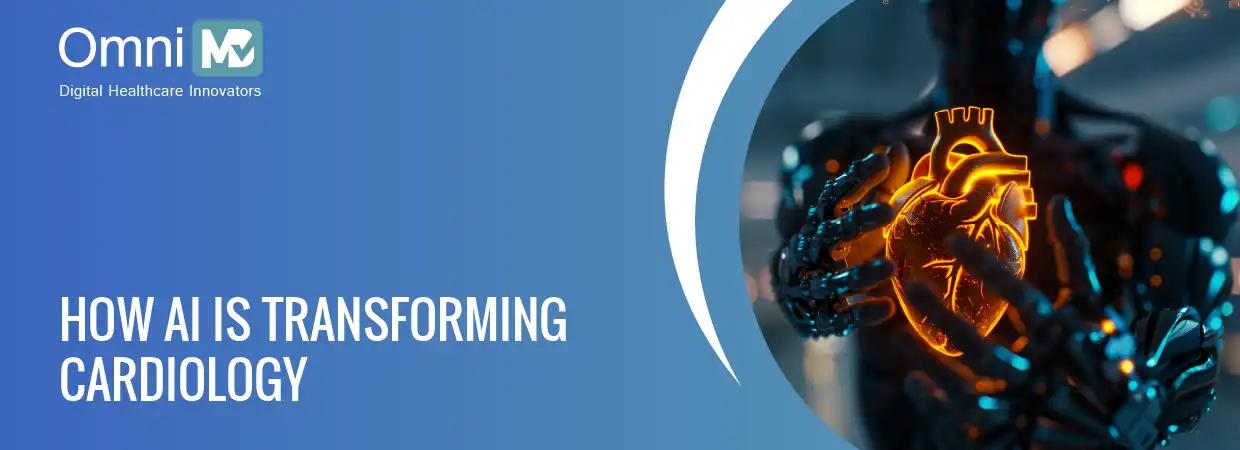How AI is Transforming Cardiology : Bridging Early Detection and Future Health
In the healthcare expanse, Artificial Intelligence (AI) is one of the technological marvels which is reshaping the landscape of cardiology. Whether it’s the early detection of cardiovascular diseases (CVDs) or the creation of personalized treatment plans, the impact of AI in cardiology is intense and multifaceted.
According to the World Health Federation, global deaths from CVDs have surged by 60%, with four out of five deaths occurring in low- and middle-income countries, over the past 30 years. With the rise of challenges in diagnosis, treatment, and management, cardiovascular diseases are still the leading cause of death worldwide.
While traditional methods have advanced significantly, the emergence of Artificial Intelligence (AI) is transforming cardiology by bringing accuracy, efficiency, and personalization to patient care.
Now, let’s understand the challenges with traditional methods and dive into how AI is forging a new era of possibilities.
Challenges of Traditional Approaches in Detection, Treatment, and Monitoring
As the burden of cardiovascular diseases continues to increase, traditional methods can face several restrictions that obstruct the effective management of these conditions.
Reduced Accuracy in Sensitivity and Specificity
Traditional diagnostic methods, such as ECGs and physical examinations may lack the sensitivity and specificity required to detect subtle cardiac abnormalities at an early stage. It can lead to delayed diagnosis and intervention which impacts patient outcomes.
Implement AI-driven diagnostic tools that can analyze data from ECGs, imaging studies, and patient records to improve sensitivity and specificity in detecting cardiac abnormalities early on. Machine learning algorithms can detect patterns and indicators which support timely diagnoses and interventions.
Diagnostic Subjectivity
Manual interpretation of diagnostic tests and imaging studies by healthcare professionals offers subjectivity that can vary between individuals. This subjectivity may result in inconsistencies in diagnosis and treatment decisions which affects the quality of care provided to patients.
Utilize AI algorithms for standardized and objective interpretation of diagnostic tests which reduces subjectivity in healthcare professionals’ assessments. AI can offer consistent diagnostic insights, reduce variations and ensures reliable treatment decisions for improved patient care.
All-Round Treatment Approaches
Traditional treatment methods often follow a standardized approach that may not have the distinctive characteristics and needs of individual patients. The all-purpose approach may result in suboptimal outcomes and limited effectiveness in managing complex cardiovascular conditions.
The modern solution is using AI-driven predictive models to analyze patient data, genetic information, and health records to create personalized treatment plans as per individual requirements. AI offers unique patient characteristics which optimize treatment outcomes and effectively manage complex cardiovascular conditions.
Limited Monitoring Capabilities
Monitoring patients with cardiovascular diseases using traditional methods, such as periodic clinic visits and self-reporting of symptoms, is not enough for capturing real-time changes in health status. Such monitoring capability prevents timely intervention and disease management.
In the modern day, AI-enabled remote monitoring systems can conduct continuous real-time tracking of patients’ health metrics. AI can detect changes in health status which facilitates timely interventions and proactive disease management which surpasses the limitations of periodic clinic visits for more effective care management.
Data Overload and Complexity
Cardiovascular diseases generate vast amounts of data, including medical records, imaging studies, and laboratory results. Traditional methods may struggle to handle this volume of data effectively which leads to challenges in data analysis, interpretation, and decision-making for healthcare providers.
By leveraging AI technologies, the healthcare field can manage and analyze vast amounts of data generated by cardiovascular diseases efficiently. AI can streamline data processing, conduct accurate interpretation, and support healthcare providers in making data-driven decisions which enhances patient care and treatment outcomes.
Resource Intensive and Time Consuming
Traditional diagnostic and treatment methods in cardiology often require significant time and resources, including multiple clinic visits, complex testing procedures, and manual data processing. It can result in delays in care delivery, increased healthcare costs, and pressure on healthcare systems.
With AI automation, healthcare providers optimize clinical workflows and reduce manual tasks in diagnostic and treatment procedures. AI can minimize time-consuming processes, enhance operational efficiencies, and alleviate resource burdens which leads to faster care delivery and reduced healthcare costs.
Limited Accessibility to Specialized Care
Access to specialized cardiology services may be limited in certain regions which leads to disparities in healthcare delivery and outcomes for patients with cardiovascular diseases. Traditional methods may not adequately address the challenge of providing equitable access to high-quality cardiac care for all individuals.
Enhance access to specialized cardiology services by integrating telehealth platforms and AI-based consultations. Remote telehealth services can bridge geographical gaps which ensures equal access to high-quality cardiac care which addresses disparities and improves health outcomes for all patients.
The Growing Role of AI in Cardiology
AI in cardiology is gaining importance due to the escalating burden of cardiovascular diseases (CVD) worldwide. According to the World Health Organization, cardiovascular diseases (CVDs) are responsible for an estimated 17.9 million deaths annually, which makes up 32% of all global deaths.
Here are some key reasons why AI is becoming essential in tackling this growing challenge.
Complexity of Cardiovascular Conditions
AI can support healthcare experts by providing tools that offer more precise diagnostic capabilities which helps in identifying subtle signs of disease progression and customize treatment plans accordingly. It improves patient outcomes and reduces the overall healthcare burden.
Early Detection for Prevention
Timely identification of cardiovascular risk factors and early symptoms is essential to halting disease progression and improving patient quality of life. AI-powered can detect patterns in patient data that may not be immediately apparent, such as early signs of arrhythmias, hypertension, or arterial blockages. By identifying these risks early, healthcare providers can implement preventive strategies, such as lifestyle changes, medications, or interventions, which reduce the likelihood of severe complications like heart attacks or strokes.
Personalized Medicine
Each patient’s cardiovascular condition is different as affected by a combination of genetic predisposition, medical history, and lifestyle factors. AI enables the creation of highly personalized treatment plans by analyzing a diverse range of patient-specific data. This includes customizing medication regimens, predicting how patients will respond to specific therapies, and developing comprehensive care plans suited to their needs. Personalized medicine ensures more effective treatment, reduces side effects and promotes better long-term health outcomes.
Enhanced Medical Imaging Analysis
AI algorithms play a transformative role in cardiology by improving the interpretation of complex medical imaging data, such as echocardiograms, cardiac CT scans, and MRIs. These algorithms facilitate the precise identification of cardiac abnormalities, such as blockages or tissue damage, and reduce the likelihood of diagnostic errors. This advancement enhances diagnostic accuracy, optimizes treatment planning, and improves the quality of care delivered to patients.
Remote Monitoring and Telecardiology
AI enables continuous monitoring of patients with cardiovascular conditions through wearable devices and telemedicine platforms. These tools collect real-time data on vital signs, such as heart rate and blood pressure which allows the early detection of irregularities. Patients, especially those in remote areas can gain access to specialized care and timely interventions through telecardiology solutions.
Efficient Administrative Operations
AI enhances operational efficiency in cardiology practices by automating administrative tasks like appointment scheduling, medical record management, and billing. By streamlining these routine processes, healthcare providers can dedicate more time and resources to patient care which results in a better overall patient experience.
Research and Innovation
AI fosters innovation in cardiovascular medicine by identifying new therapeutic targets, facilitating drug discovery, and evaluating treatment outcomes. These advancements accelerate research and ensure that new treatments and technologies transition more quickly into clinical practice which improves patient outcomes and advances the field of cardiology.
Identification of Heart Condition via Predictive Algorithms
Predictive algorithms can identify subtle patterns linked to heart conditions by leveraging machine learning and deep learning. They use feature selection to focus on critical predictors like cholesterol levels, blood pressure variations, and heart rate irregularities which enable the early identification of at-risk individuals. Deep learning architectures, such as convolutional neural networks, process complex imaging data like CT scans to detect subtle structural anomalies in the heart. In addition, these algorithms analyze rare and underrepresented risk factors by offering a comprehensive assessment of cardiovascular risks for improved disease prediction and management.
Integration of Patient Data
Artificial Intelligence (AI) customize treatments by integrating diverse patient data. AI-driven precision medicine identifies genetic markers to customize interventions for specific cardiovascular conditions. Risk stratification algorithms assess disease likelihood by analyzing combined genetic, lifestyle, and historical data which enables early prevention. AI models predict individual treatment responses, optimizing efficacy while minimizing adverse effects.
Continuous monitoring systems track real-time health metrics which enables adaptive therapies as conditions evolve. Clinical decision support tools leverage comprehensive patient data to provide personalized treatment recommendations, while AI also adjust medication dosages and protocols for maximum effectiveness and safety.
Suggested Read : The Shift to Value-Based Care in Cardiology
Primary AI Tools for Cardiology
Several tools and technologies leverage Artificial Intelligence (AI) for analyzing ECGs, echocardiograms, and CT scans in the field of cardiology.
Here are some examples.
ECG
AliveCor Kardia: This device uses AI algorithms to analyze ECG recordings captured by a smartphone. It can detect abnormal heart rhythms such as atrial fibrillation.
Cardiologs: A cloud-based platform that utilizes AI to interpret ECG data and provide insights to healthcare professionals for faster and more accurate diagnosis of heart conditions.
Echocardiogram Analysis
EchoNous KOSMOS: This handheld ultrasound device combines ultrasound imaging with AI-guided interpretation to assist healthcare providers in performing echocardiograms and diagnosing cardiac conditions.
Ultromics: A platform that utilizes AI algorithms to analyze echocardiograms and provide automated measurements of cardiac structures and functions which assess heart health.
CT Scan Analysis
Subtle Medical: AI-powered software that reduces image noise and enhances image quality in CT scans which leads to diagnostic accuracy and reduced radiation exposure for patients.
Zebra Medical Vision: Offers AI algorithms that analyze CT scans to assist in the detection and early diagnosis of cardiovascular diseases, including coronary artery calcification and pulmonary embolism.
Future Trends of AI in Cardiology
Drug Discovery
AI algorithms can accelerate drug discovery processes by predicting drug candidates which simulate drug interactions, and optimize personalized treatment regimens through genomic profiling and patient data analysis.
Robotic Surgery
AI-integrated robotic systems are expected to become more prevalent in cardiology for minimally invasive procedures, improving precision, reducing errors, and enhancing surgical outcomes for complex surgeries.
Data Privacy
Ensuring patient data confidentiality and security is vital in AI applications within cardiology, hence addressing data privacy concerns is important. Implementing robust encryption methods, anonymization techniques, and strict access controls will be crucial to safeguard patient information.
Augmented Reality (AR) and Virtual Reality (VR) Applications
Augmented Reality (AR) and Virtual Reality (VR) technologies are expected to play an increasingly significant role in various aspects of cardiology in the coming years. In training settings, healthcare professionals, including cardiologists, surgeons, and medical students, can benefit from immersive experiences provided by AR and VR applications. These technologies offer hands-on simulations of intricate cardiac procedures, such as catheterizations or electrophysiology interventions which allows practitioners to practice in a risk-free virtual environment before performing these procedures on actual patients.
Regulatory Challenges
Regulating AI technologies in cardiology will be challenging due to the rapid growth of AI algorithms and the complexity of regulatory frameworks. Establishing clear guidelines, standards, and oversight mechanisms will be crucial to ensure the safety and efficacy of AI applications in cardiology.
Integration of Genomic Data
The integration of Genomic Data with AI algorithms offers a groundbreaking frontier in cardiology with insights into the genetic base of cardiovascular diseases. By combining genomic data with clinical information, AI-powered analyses can delve deep into the intricate genetic profiles of individuals, by giving attention to predispositions, hereditary factors, and personalized risk assessments for various cardiovascular conditions.
Ethical Considerations in AI in Cardiology
Clinical Governance
Establishing robust governance frameworks and oversight mechanisms is essential to monitor the performance, safety, and ethical compliance of AI systems in cardiology. Clinical validation, regular audits, and adherence to ethical guidelines can help mitigate risks and ensure high-quality healthcare delivery.
Informed Consent
Respecting patient autonomy and obtaining informed consent for the use of AI technologies in cardiac care is important to establish trust, promote patient engagement, and uphold ethical principles in healthcare delivery.
Accountability and Liability
Defining roles and responsibilities for healthcare providers, developers, and stakeholders in the deployment of AI systems in cardiology is essential to determine accountability and liability in case of adverse events or errors.
Equity and Access
Ensuring equitable access to AI-powered cardiology technologies and addressing disparities in healthcare delivery is crucial to prevent exacerbating existing inequalities and to promote fair and just healthcare outcomes for all patients.
Privacy and Data Security
Safeguarding patient data privacy and maintaining strict data security measures are paramount in AI-driven cardiology applications. Healthcare organizations must adhere to data protection regulations, implement robust encryption protocols, and establish clear guidelines for data sharing to protect sensitive medical information.
Wrapping Up
As we look towards the future, the potential of AI in cardiology is immense which promises to transform the field by facilitating early intervention, personalized treatment strategies, and improved patient outcomes. By utilizing the potential of AI, healthcare domain can unlock new possibilities for enhancing cardiological care which paves the way for a healthier and personalized approach to cardiovascular health for patients worldwide.

Best EHR for Your Cardiology Practice
Streamline your cardiology practice and improve patient care effortlessly

 Written by Neha Singh
Written by Neha Singh
 Reviewed by Shivani Joshi
Reviewed by Shivani Joshi





